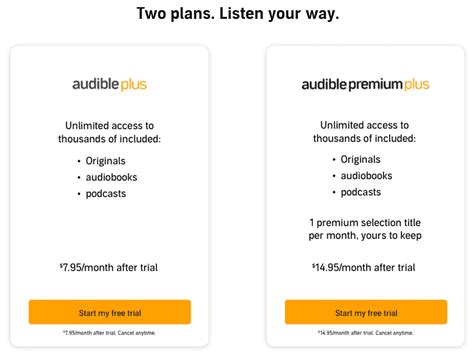3 Ways to Keep Audible Books After Cancelling

In the world of digital audiobooks, Audible has become a household name, offering a vast library of titles for avid listeners. However, a common concern among users is what happens to their purchased books when they decide to cancel their subscription. The good news is, there are ways to retain your Audible collection even after parting ways with the service. Here’s an in-depth look at three effective strategies to ensure your audiobooks remain accessible.
1. Understanding Audible’s Ownership Policy
Before diving into the methods, it’s crucial to grasp Audible’s stance on book ownership. When you purchase an audiobook from Audible, you’re essentially buying a license to access the content, not the content itself. This means that even after cancellation, your books are tied to your account and can still be accessed under certain conditions.
Key Point: Audible allows users to keep their purchased books indefinitely, as long as they can access their account. This is where the first strategy comes into play.
Method 1: Retain Access to Your Audible Account
The simplest way to keep your Audible books after cancelling is to maintain access to your account. Here’s how:
- Do Not Delete Your Account: When cancelling, ensure you do not delete your Audible account. Deleting the account will permanently remove access to your library.
- Use the Audible App or Website: Continue to use the Audible app or website to access your library. Even without an active subscription, you can still listen to your purchased books.
- Download Books for Offline Listening: Before cancelling, download all your audiobooks to your device. This ensures you have a local copy, which can be accessed anytime, even without an internet connection.
2. Transferring Audible Books to Other Devices
Another effective method is to transfer your Audible books to other devices or platforms, ensuring they remain accessible even after cancellation.
Method 2: Convert Audible Books to a Universal Format
Audible books are typically protected by Digital Rights Management (DRM), which restricts their use to Audible-compatible devices. However, you can convert these files to a DRM-free format, allowing them to be played on any device.
Step-by-Step Conversion Process:
- Use Audible’s Download Feature: Download the audiobook to your computer using the Audible app.
- Convert to MP3: Use a third-party tool like Audacity or TuneFab to convert the AA or AAX file to MP3 format. This process removes the DRM protection.
- Transfer to Desired Device: Once converted, transfer the MP3 files to your preferred device, such as a smartphone, tablet, or MP3 player.
Legal Consideration: While converting DRM-protected files for personal use is generally accepted, distributing these files is illegal. Always ensure compliance with copyright laws.
3. Utilizing Cloud Storage and Streaming Services
For those who prefer not to deal with file conversions, leveraging cloud storage and streaming services offers a convenient alternative.
Method 3: Upload to Cloud Storage and Stream
By uploading your Audible books to a cloud storage service, you can stream them from anywhere, ensuring they remain accessible even after cancelling your subscription.
Recommended Cloud Services:
- Google Drive: Offers 15GB of free storage and seamless integration with Android devices.
- Dropbox: Provides 2GB of free storage and easy file sharing.
- Microsoft OneDrive: Comes with 5GB of free storage and integrates well with Windows devices.
Streaming Options:
- VLC Media Player: Supports streaming from cloud storage and plays various audio formats.
- Plex: Allows you to create a personal media server, streaming your audiobooks to any device.
Comparative Analysis of Methods
To help you decide the best approach, here’s a comparative analysis of the three methods:
| Method | Ease of Use | Cost | Accessibility | Technical Skill Required |
|---|---|---|---|---|
| Retain Audible Account | High | None | High | Low |
| Convert to Universal Format | Medium | Varies (Free to Paid) | High | Medium |
| Cloud Storage and Streaming | High | Varies (Free to Paid) | Medium | Low |

Future Trends: The Evolution of Digital Book Ownership
As digital media consumption grows, the concept of ownership is evolving. Platforms like Audible are increasingly offering more flexible options, such as lifetime access to purchased content. Additionally, blockchain technology is being explored to provide true ownership of digital assets, potentially revolutionizing how we interact with digital books.
FAQ Section
Can I still listen to Audible books after cancelling my subscription?
+Yes, as long as you retain access to your Audible account, you can continue to listen to your purchased books.
Is it legal to convert Audible books to MP3 format?
+Converting DRM-protected files for personal use is generally accepted, but distributing these files is illegal.
What happens if I delete my Audible account?
+Deleting your Audible account will permanently remove access to your library, so it’s advisable to download your books beforehand.
Can I upload Audible books to any cloud storage service?
+Yes, you can upload Audible books to most cloud storage services, but ensure you have the necessary permissions and comply with their terms of service.
Are there any free tools to convert Audible books to MP3?
+Yes, tools like Audacity are free and can be used to convert Audible books to MP3 format.
Conclusion
Cancelling your Audible subscription doesn’t mean losing your cherished audiobooks. By retaining access to your account, converting files to a universal format, or utilizing cloud storage, you can ensure your collection remains accessible. Each method has its advantages, so choose the one that best fits your needs and technical comfort level. As the digital landscape evolves, staying informed about ownership rights and emerging technologies will empower you to make the most of your digital library.


